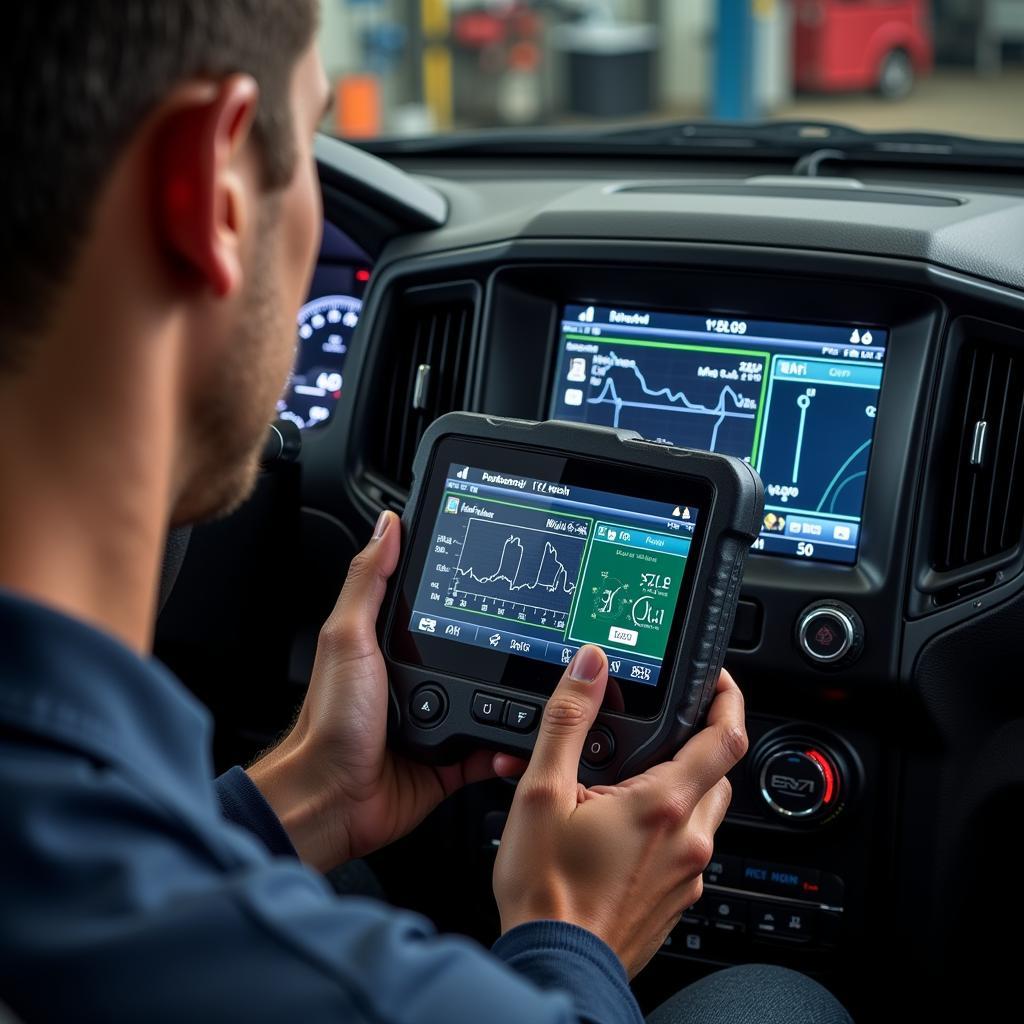Finding a scan tool that can truly do it all can feel like searching for a mechanic’s Holy Grail. With so many options boasting various features and functionalities, it’s easy to get lost in the jargon and spec sheets. This article is your comprehensive guide to understanding “scan tools that do everything,” cutting through the noise to help you make an informed decision for your automotive needs.
What Does “Scan Tool That Does Everything” Really Mean?
Before diving into the specifics, let’s define what “everything” actually entails in the context of scan tools. While no single tool can truly cater to every possible automotive need, an all-encompassing scan tool should ideally offer:
- Comprehensive System Coverage: From engine and transmission to ABS, airbags, and even advanced driver-assistance systems (ADAS), the tool should be able to diagnose and interact with a wide range of vehicle systems.
- Advanced Diagnostics: Beyond simply reading and clearing codes, a truly versatile tool should offer in-depth diagnostic capabilities, such as live data streaming, bi-directional controls, and special functions like DPF regeneration or injector coding.
- User-Friendly Interface: A complex tool is only as good as its usability. An intuitive interface with clear navigation and easy-to-understand data presentation is crucial.
- Regular Updates: The automotive landscape is constantly evolving. A future-proof scan tool should receive regular software updates to ensure compatibility with new vehicle models and technologies.
 Mechanic using a comprehensive scan tool dashboard
Mechanic using a comprehensive scan tool dashboard
Key Features to Look for in an All-in-One Scan Tool
Now that we’ve established the criteria, let’s break down the specific features that contribute to a scan tool’s versatility:
1. Extensive Vehicle Coverage
- Make and Model Compatibility: Ensure the scan tool supports a wide range of makes and models, including both domestic and import vehicles.
- System Depth: Look for tools that go beyond basic OBD-II functionality and offer module-specific diagnostics for various systems like ABS, SRS, TPMS, and more.
2. Advanced Diagnostic Functions
- Live Data Streaming: View real-time sensor data in various formats (graphs, gauges) to monitor system performance and identify intermittent issues.
- Bi-Directional Controls (Active Tests): Interact with vehicle systems by commanding components on and off, such as activating solenoids, relays, or even cycling the ABS pump.
- Special Functions: Access manufacturer-specific functions like DPF regeneration, injector coding, key programming, and electronic parking brake service routines.
3. User Experience and Support
- Intuitive Interface: Look for tools with user-friendly menus, logical navigation, and clear data presentation.
- Data Logging and Reporting: The ability to record data logs and generate reports can be invaluable for troubleshooting intermittent problems or sharing information with other technicians.
- Technical Support and Resources: Reliable technical support, comprehensive documentation, and online resources can greatly enhance the user experience.
Different Tiers of Scan Tools
Scan tools are often categorized into different tiers based on their features, capabilities, and target user:
- Entry-Level (Code Readers): These affordable tools are primarily designed for reading and clearing basic OBD-II codes. They are suitable for DIY enthusiasts or car owners who want to perform simple diagnostics.
- Mid-Range (Professional Scan Tools): Offering a wider range of features like live data streaming, bi-directional controls, and some special functions, these tools cater to professional technicians and experienced DIYers.
- High-End (Factory-Level Diagnostic Tools): Designed for dealerships and specialized repair shops, these tools provide the most comprehensive diagnostics, programming capabilities, and access to manufacturer-specific information.
Choosing the Right Scan Tool for Your Needs
Selecting the right scan tool depends on your individual needs, budget, and skill level. Consider these factors:
- Frequency of Use: Occasional DIY use might justify an entry-level tool, while professional mechanics require more advanced options.
- Vehicle Types: Ensure the tool supports the makes and models you work on, especially if you specialize in a particular brand.
- Desired Features: Prioritize the features that are most important to you, whether it’s bi-directional controls, special functions, or data logging capabilities.
- Budget: Set a realistic budget and explore tools that offer the best value for your money.
“A Scan Tool That Grows With Your Expertise”
Robert Johnson, a seasoned automotive technician with over 20 years of experience, emphasizes the importance of choosing a tool that aligns with your skill level. “Start with a tool that meets your current needs but allows room for growth. As your expertise expands, you can explore more advanced functionalities and gradually master the tool’s full potential.”
Conclusion:
Finding a scan tool that does everything doesn’t mean finding a magical device. It’s about carefully evaluating your requirements and selecting a tool that empowers you with comprehensive diagnostics, user-friendly operation, and the versatility to tackle a wide range of automotive tasks. Remember, the right scan tool is an investment in your automotive knowledge and capabilities, helping you diagnose issues accurately and confidently.
FAQs
Q: Can a scan tool program keys?
A: Some advanced scan tools offer key programming capabilities, but not all. This feature is more common in high-end or factory-level tools.
Q: Do I need a scan tool for every car I own?
A: While not strictly necessary, a scan tool can be incredibly useful for diagnosing and resolving car problems, potentially saving you time and money on repairs.
Q: Can a scan tool reset the check engine light?
A: Yes, most scan tools can reset the check engine light after addressing the underlying issue that triggered the warning.
Need help finding the perfect scan tool for your needs? Check out our in-depth reviews of 4×4 scan tools, Solus Ultra scan tools, and more!
For personalized recommendations and expert advice, contact us via WhatsApp: +1(641)206-8880, Email: [email protected] or visit us at 276 Reock St, City of Orange, NJ 07050, United States. Our dedicated customer support team is available 24/7 to assist you.


